What Supplements Should I Take and Which Ones Should I Avoid?
The best Nerd Fitness email I’ve ever received started like this:
“Just want to let you know, your website is totally and completely useless. It doesn’t talk about supplements and it discourages use of machines (WHY???)”
Then, he asked for my best advice. I couldn’t help but chuckle.
Thinking back, it was the nicest thing anybody could have said about Nerd Fitness.
This poor gentleman wanted to use machines and pump his body full of supplements to receive the fastest results possible without putting in the hard work and dedication required. He grew discouraged when he saw Nerd Fitness promoted the consumption of real food and the lifting of actual weights rather than quick fixes.
Every week we get dozens of emails from people asking about supplements: which ones are bogus, which ones are legit, and if they even need to bother at all.
Honestly, there’s a reason it took me 5.5 years and nearly 600 articles to finally publish something on supplements: it’s a tricky freaking subject!
I’m not a doctor. Just a nerd trying to shed some light on a ridiculously overcrowded industry full of shady marketing and dubious claims. Like anything else, track your own results, do your own research, talk to your doctor, and draw your own conclusions.
Any recommendations here or any brands mentioned are simply because we like and use them.
Deep breath…and here…we…go!
The Most Important Thing You Need to Know About Supplements
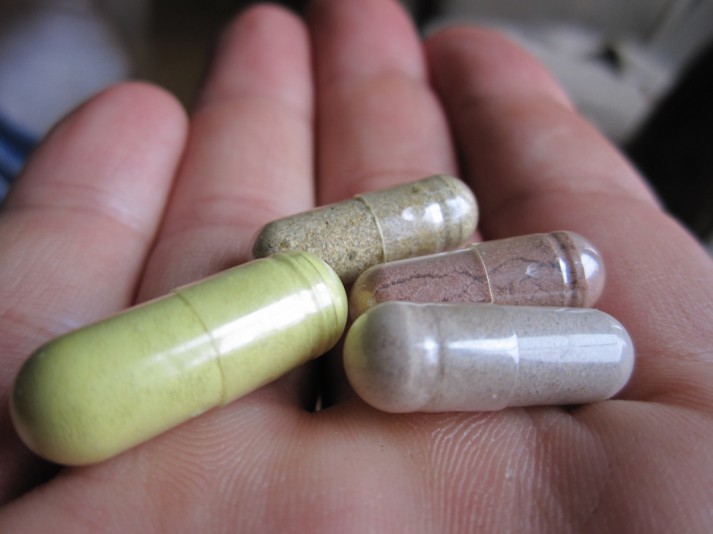
“Which supplements are necessary for a healthy life?”
“Which supplements will help me build muscle?”
“Which supplements will help me lose weight faster?”
Want to know the MOST IMPORTANT THING EVER ABOUT SUPPLEMENTS?
Unless you have a particular illness, a nutritional/hereditary problem, or are required by a doctor to take a supplement, NONE of them are requirements.
Think of it in terms of a video game: power-ups can sometimes enhance or improve your effectiveness, but without having basic skills beforehand they are a waste. (Like getting star power in Super Mario Brothers and immediately falling in a pit. Suck!)
So, long story short: YOU DON’T NEED SUPPLEMENTS.
We thrived as a species for quite a few years (tens of thousands!) before pills and powders came along, which means we can STILL thrive without them! Nothing beats a solid long term diet and regular physical activity.
Just take a look at the name: “supplement.” These products are meant to “supplement” a healthy diet, not “replace” it.
Like with any video game, a solid understanding of the basics (running, flying, driving) is the quickest way to succeed. Focus your efforts on the basics, too (and you’re reading the right website for that!).
People like Saint transformed without supplements:
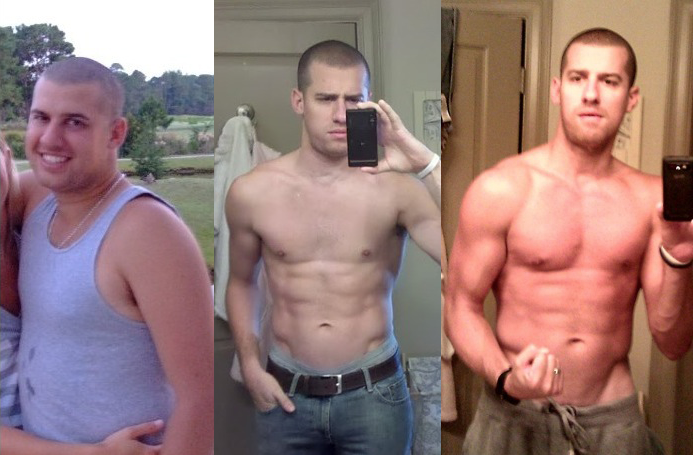
People like Joe transformed without popping pills:
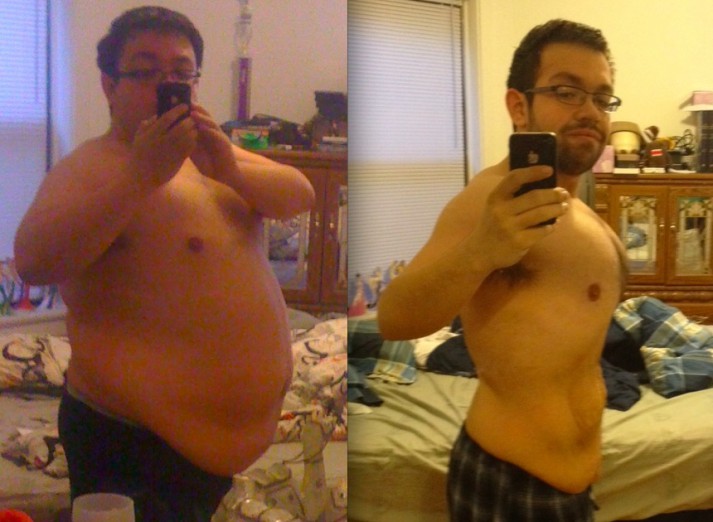
Staci’s transformation started to take shape only after she stopped trying methods like weight loss shakes and pills:
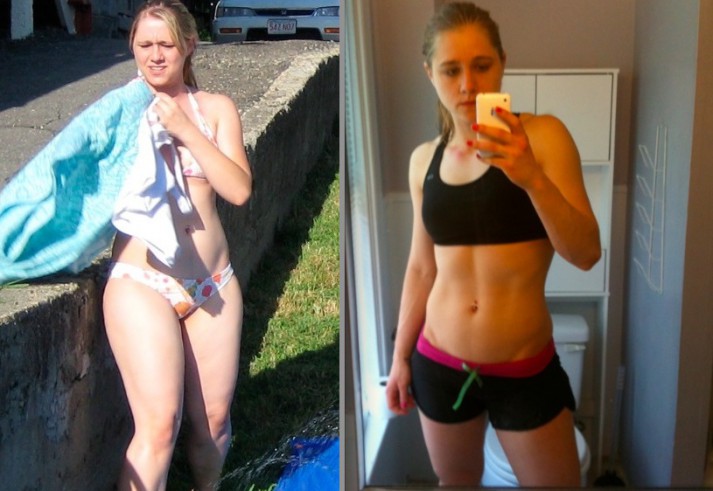
Here’s the secret: There is no pill, powder, or supplement that will get you the results you want!
In addition to the success stories above, we have hundreds of Private 1-on-1 Coaching Clients right now who are working with Nerd Fitness Trainers and seeing incredible results. And guess what… almost none of them are using regular supplements as part of their training and diet.
There is no magic bullet that will cure all of your problems.
Any advertisement or commercial that tells you their supplement will help you lose weight or build muscle rapidly without making any other changes is full of sh**!
Talk to any of our experienced Nerd Fitness trainers and they all will say the same thing – it takes hard work, consistent effort, a focused plan, and dedicated nutrition.
If you want our help navigating this the sustainable, long-term way – you can schedule a completely free, quick call with a NF Team Member to see if coaching may be a good fit for you (and your potential coach) here. It takes just a few minutes to schedule.
Whether or not you need help with this process, stay away from anyone who wants to sell you the “power up” without bothering to tell you the importance of learning to play the game. Supplement companies bank on you looking for that quick fix.
Unfortunately, this is what far too many people do: Eat like crap. Sleep poorly. Skip exercise. Then take a bunch of pills designed to ‘cure’ the issues associated with that lifestyle…instead of TAKING STEPS TO FIX THE LIFESTYLE! They look for the quick fix with minimal effort.
This is disastrous.
Here’s what Nerd Fitness Rebels do instead: Eat right. Get plenty of sleep. Strength train.
ONLY after that should you concern yourself with further increasing performance with supplements.
Tread lightly with the supplement industry
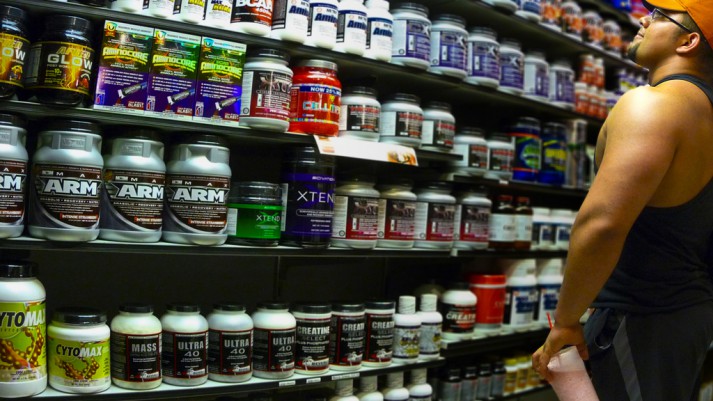
Sales of supplements in the United States reached $11.5 billion dollars in 2012.
People love get-fit-quick products because they promise results without all of that terrible stuff called ‘hard work.’
For that reason, the supplement industry has exploded, with vitamin shops and supplement stores popping up as fast as Apple stores.
Remember playing Mario Kart, racing past your friends going for the item box, hoping for red shells or star power. Instead, you suddenly explode; it wasn’t a powerup, it was a trap! The supplement industry is no different.
The sad reality is, the supplement industry is largely unregulated. Anybody can stick a bunch of ingredients in a tub, slap a $89.99 price tag on it, and make wild claims, regardless of whether or not it’s safe. In fact, there’s no requirement to get approved by the FDA for your “dietary supplement” before you put it on the market.
This quick clip from the must-watch documentary “Bigger, Faster, Stronger” is incredibly eye opening:
The Truth about the American Supplement Industry
So, all supplements are bad?
Nay!
Sure, a strong majority of supplements are pure garbage and a waste of time. HOWEVER, there are situations in which having a supplement IN ADDITION to a quality nutritious diet can be beneficial.
Supplements can be helpful in filling in small deficiencies and increasing performance, depending on the person and situation.
Now, there are different types of supplements:
- Basic supplements with few to no added ingredients: think multivitamins, protein powders and branched-chain amino acids (BCAAs).
- Supplement cocktails, which throw a bunch of things into a pill or powder and promise muscle gains or quick fat loss, whether it’s a “pre-workout,” “meal replacement,” or “post workout.” The names of these things generally have exclamation points, numbers for letters, and use Z’s instead of S’s. You know which ones I’m talking about.
For the purposes of this article, we’re going to ignore the supplement cocktails, and suggest that people ignore their grandiose claims as well. If you are an advanced bodybuilder or somebody who wants to take these types of supplements, there are sites out there dedicated to those very things.
For the rest of us, we’re going to cover the the most important stuff.
What supplements should I avoid?

Let’s go over the most popular supplements you SHOULDN’T use. These are the bombs on the Mario Kart course that look suspiciously like the real thing.
Weight Loss/Performance Enhancers. Weight loss pills are a big DO NOT USE. I don’t care how much weight your friend lost using the most recent version of Hydroxicut or Lipo-6, they do not provide permanent healthy results, can be dangerous, and are not the way to go.
Here’s a quote from this article from the U.S. Food and Drug Administration in reference to the fraudulent weight-loss diet pill industry:
“These products are not legal dietary supplements,” says Michael Levy, director of the Food and Drug Administration’s (FDA’s) Division of New Drugs and Labeling Compliance. “They are actually very powerful drugs masquerading as ‘all-natural’ or ‘herbal’ supplements, and they carry significant risks to unsuspecting consumers.”
At best, these supplements can provide short term weight loss. More likely however, they’ll either be ineffective or create even more issues. There are no shortcuts in health and fitness if you want the results to last.
Detoxes and Water Pills: Cleanses, 7 day detoxes, and the like have big claims for how much weight you can lose in a short amount of time.
And they work…except that the results aren’t real and only last a day or two, making you think you need to use them again:
- Diuretics (water pills) decreases the amount of water in your system through various methods depending on the pill, dehydrating you.
- “Fasting” or only drinking juice for a few days actually empties your body of any real food – which can weight a significant amount and can falsely swing the scale!
- Detoxes and cleanses have been proven time and time again to be a complete scam.
Your body is 70% water for a reason – taking pills to reduce it can mess up your electrolytes, metabolism, your workouts, and can have lasting damage to your health.
Laxatives: Never take them for weight loss. The only thing laxatives actually do is cause your large bowel to empty, and the only reason you may “lose weight” while using them is that it decreases your overall water weight. Continued use (more than a week or two) can cause long term damage. If you think you’re absorbing less calories from your food by using them (a common myth) – you’re not. Our body absorbs all of the calories in your food before the laxatives have any effects.
These three big categories are parlor tricks, not real solutions. Don’t be fooled! These options only treat the symptoms of an unhealthy lifestyle, rather than attacking the actual problem at its source: the unhealthy lifestyle.
Nerd Fitness can get you started down the right path, teach you to play the game properly, and it won’t cost you a dollar. Start here, and mix in some of this, and thank me later 🙂
NOW, once you’ve addressed THOSE issues and put yourself on the path to an healthier lifestyle, we can talk about supplements that might be worth it for ya.
OK, but what about my morning multivitamin!?!

First, calm down.
I’m going to guess your doctor told you take a multivitamin every day.
If you’re taking one supplement right now, I bet this is it.
So let’s get into it. Believe it or not, the importance and effectiveness of multivitamins, the cornerstone of the health supplement industry, has been called into question. A massive study covering multivitamins determined that for a huge majority of healthy individuals with no deficiencies, multivitamins are largely unnecessary!
“On October 10, 2011, researchers from the University of Minnesota evaluated 39,000 older women and found that those who took supplemental multivitamins, magnesium, zinc, copper, and iron died at rates higher than those who didn’t. They concluded, “Based on existing evidence, we see little justification for the general and widespread use of dietary supplements.”
However, in another study different conclusions were drawn:
“Some scientists believe there is not enough evidence to recommend for or against taking a daily multivitamin, because there isn’t yet enough data from randomized controlled trials. (17) That’s a reasonable but short-sighted point of view since it may never be possible to conduct randomized trials that are long enough to test the effects of multiple vitamins on risks of cancers, Alzheimer’s disease, and other degenerative conditions.
Looking at all the evidence—from epidemiological studies on diet and health, to biochemical studies on the minute mechanisms of disease—the potential health benefits of taking a standard daily multivitamin appear to outweigh the potential risks for most people. (18)”
So, which one do we believe? Personally, through our research we’re of the school of thought that a multivitamin can be beneficial for somebody that has nutritional deficiencies, is pregnant, or is above the age of 50. Your focus should still be on eating a high quality, nutritious diet with plenty of vegetables, and a multivitamin could help plug any deficiences if you have them.
I reached this conclusion after discovering Dr. Roizen, who analyzed the data from the above study and pointed out a significant number of improvements from people that DID have some deficiency who took a multivitamin.
His recommendation: “You still will benefit from taking half a daily multivitamin containing important nutrients at levels close to their recommended daily allowance twice a day if you are potentially going to become, or are, pregnant, or as an insurance policy against an inadequate diet in people over 50.
Because there are so many options, here are some things to consider when picking a multivitamin:
- Serving Size: If you are interested in taking a multivitamin, make sure you read the label and notice the serving size. Do you take it once a day? Twice a day?
- Iodine: With the switch to non iodized salts and how bread is made (and less bread consumption), more people are seeing an iodine deficiency than we have seen in a long time.
- Iron: I would suggest getting an iron panel from your doctor before taking a supplement with iron – Iron supplementation is quite complex and it is just often assumed that we need it (especially women).
- Calcium: You don’t want a hugely high calcium content, despite the fact that you’ve probably been told “more calcium = stronger bones!” Believe it or not, calcium deficiency is more complex than imagined.
- Other ingredients: You’ll definitely want to check these if you’re trying to stay away from soy or if you’re a vegetarian. Some have no “other ingredients,” and some are full of chemicals to keep them together. Generally the higher the quality vitamin, the less other ingredients.
“Ugh, Steve. So do I take one or not?!” you say. Fine!
Bottom line: Eat a well-rounded diet, with plenty of vegetables (including dark leafy greens like spinach and kale) and skip the multivitamin. If you think you do have a nutritional deficiency, or you’re pregnant, consider a multivitamin after a chat with your doctor.
Just don’t expect to pop a multivitamin each morning and have it cure all issues.
What about protein powders?

You’ve probably heard people (or seen ads) talking about how protein powders are a necessary part of building muscle. You might even have been told that you must drink a protein shake every two hours or your muscles will disappear faster than GOB’s yacht.
The truth is…protein powders can ALSO be unnecessary.
YES, protein is an important part of building muscle (protein is like…the building blocks you need to build your Starship Enterprise replica in Minecraft). Your muscles need that protein, and can get that protein from either a protein supplement or from real food like chicken, steak, eggs, nuts, etc.
If you’re getting enough protein in your diet, there is no need for you to also take a protein supplement. If you’re wondering, we recommend 1 gram of protein per pound (or 2 grams per KG) of lean body mass, which is your bodyweight minus how much body fat you have. If you don’t know that, aim for .8 grams per lb of total bodyweight.
Now, the benefit to protein powders: if you are very busy or trying to build muscle, finding a way to consume enough natural protein every day can be a challenge (which is where a convenient protein shake can come in handy).
“That’s great Steve, I’m busy! I don’t eat enough protein regularly. What do I do now?”
There are many different types of protein powders.
The big three on the market:
- Whey protein
- Egg protein
- Soy protein
1) Whey protein is the most popular, readily available, and cheapest options. Whey is what remains after milk has been curdled and strained. It contains lactose, so if you’re lactose intolerant, stay away from whey :).
2) Egg protein powders are made from, you guessed it, the protein in eggs – which means may be a great alternative if you can’t use whey.
3) The other most popular protein is soy, which is a complicated beast. A lot of the more popular shakes on the market (like Body by Vi and Advocare) use soy protein, so be wary of those products. We’ll be doing a monster article soon on all things soy, so stay tuned.
When choosing a protein powder, make sure to look at the ingredients and find one from a reputable brand. Always do your research even if it is one the most popular brands (such as Muscle Milk). Some of these have had metals such as arsenic found in them.
We should also mention that many popular protein powders are just not great in terms of meeting their promises. Check out this lab ratings review of “high quality” protein powders that meet this reddit protein powder measurement results thread. There’s lot of fraudulent stuff out there, so make sure you keep your Sherlock Holmes hat on when shopping!
The final word: pumping yourself full of 300g of protein isn’t necessary. So, don’t overthink it. Eat real food. If you cannot get enough protein every day, consider a protein supplement, understanding that it’s not gonna make you sprout Hulk-like muscles (here’s how to do that).
Tell me about other supplements!

I love your enthusiasm. Let’s jump right in. These are the supplements we get the most common questions about:
Fish Oil: One of the most studied and widely accepted supplements as beneficial, touting claims anywhere from reducing inflammation to reducing depression. However, like every other supplement out there, there are some negative claims too.
Examine feels like Fish Oil is important. I know Sol and trust his research methods. As does Mark’s Daily Apple. Although you might hear otherwise, we don’t believe that Flaxseed Oil provides all the same benefits as Fish Oil, as pointed out here.
Vitamin D: Vitamin D can be an important supplement to consider if there isn’t any in your multivitamin, you don’t consume dairy, and you don’t get 20 minutes of direct sunlight every day. As Mark’s Daily Apple points out, dietary Vitamin D or Vitamin D from sunlight will produce the same results.
Although some say a Vitamin D supplement is a waste, Examine disagrees, as do we. Vitamin D, either in supplement form or from direct sunlight, can be beneficial!
Branched Chain Amino Acids: BCAA’s are three amino acids – leucine, isoleucine, and valine. These play a role in protein synthesis and glucose uptake into cells, which is definitely something we want to encourage when trying to build muscle. However, they are naturally found in protein and unless you are working out fasted, the studies are inconsistent at best on if supplementing with them will actually help with anything. Conclusion? Get them from food!
Caffeine: This is often the main ingredient in weight loss supplements and performance enhancers, and for a reason – it definitely “speeds you up.” It’s been shown to increase your endurance and power output, while reducing Delayed Onset Muscle Soreness (DOMS).
Now, you’ll definitely build up a tolerance to caffeine pretty quick (as any coffee drinker knows!), which means I would try to stay away from completely relying on caffeine for your workout energy. For more, check out our massive article on caffeine.
Creatine: Creatine is one of the most researched and commonly used supplements in the world. It’s a substance that’s naturally occurring in your body, and is also found in food such as meats, eggs, and dairy.
Here’s a quick rundown: creatine stores phosphates in your body in the form of phosphocreatine, which aids in cellular function. When you take creatine, your muscles can retain more water, which helps your muscles work more efficiently. Now, because one’s water weight is increased, creatine can make some feel bloated.
The verdict: If your goal is general weight loss and fitness, don’t worry about a creatine supplement. It occurs naturally in your animal protein sources (like red meat).
However, if your goal is oriented towards powerlifting, increased athletic performance, or weightlifting, it may be something to consider. Do your research and make sure to check with your doctor. There are conflicting reports about consumption of creatine and kidney issues with those who have preexisting kidney issues. Again (as always), ask your doctor first!
Calcium: For most people, the calcium consumed from dairy, dark leafy greens, and/or in a multivitamin is enough. You MIGHT consider taking a standalone calcium supplement, but we do not recommend it. Recent studies have shown that our bodies process calcium supplements differently than calcium from food. Aim to get calcium from real food.
Fiber: If you’re eating your veggies, you should not need a fiber supplement. The goal should be about 25g-30g of fiber a day (about 14g per 1000 calories you consume).
CLA (Conjugated Linoleic Acid): One of the most popular “leaning out” supplements – it’s a fatty acid that’s found in beef and dairy. Some studies claim that it helps reduce body fat mass (in adults that exercise) but other studies show that results are inconsistent or that it does nothing. In our opinion, you should focus on getting CLA through your diet, and not a supplement.
ZMA: This is just zinc, magnesium, and vitamin B. Some sites claim that it boosts testosterone (though we can’t find any good studies to back this up), and performance, though this study shows otherwise. There are studies that show that magnesium and zinc can help you sleep. If you can get enough magnesium from items like nuts and leafy greens, and zinc from meat and/or shellfish, this supplement is not necessary.
Beta-Alanine: Beta alanine is found in a ton of pre-workout supplements. If you’ve ever gotten “tingles” after taking one – this is what they are from. It’s a non-essential beta-amino acid that’s naturally occurring in the body and also found in many meats and eggs, and claims to reduce fatigue helping you get one extra rep. Studies are inconsistent, but many do show a minor improvement. Conclusion? Supplement this naturally through your diet and protein rich foods like chicken, beef, and fish.
What else can I answer?

To answer your first few questions:
What do you think about [this supplement]? I’m not a big supplement guy at all, so I may not have a strong opinion on your particular brand. I’m gonna give a big shout out to my friend Sol Orwell over at Examine.com, who has done some of the most extensive research on supplements I have EVER seen.
What supplements do you take Steve? BCAA (before a fasted workout, as recommended by Lean Gains), Whey Protein occasionally, Butter Oil/Fermented Cod Liver Oil (as recommended by 4-Hour Body, for experimentation purposes).
What supplements does Staci take? BCAA (when working out fasted), Whey Protein, ZMA, and a multi-vitamin (but only because of deficiencies due to some medical diet restrictions). She also takes fish oil if she doesn’t eat a lot of fish that week, but tries to get as much from her diet as possible.
PHEW!
Okay so this is a monster of a post, and a lot to get through. Let me know what further questions you have – on this topic. I’ll do my best to chime in, understanding that I don’t know your particular health situation, I’m not a doctor, and I’m not even wearing any pants right now.
ONE FINAL THING: I’m going to guess that you’re looking to take supplements because you’re interested in getting bigger, stronger, and leaner. I can tell you that supplements make up less than 5% of the equation, and will only work if you’re ALSO eating a great diet and training correctly.
If you’ve spent time in a gym and aren’t getting results, you might not have a plan in place that works for your body type, lifestyle, and physiology – which might be why you’re reading this article in the first place – to get results sooner!
You’re in the right place – if you enjoyed this no-nonsense article on supplements, its because we live and breathe this stuff, helping busy people like you cut through the crap in the fitness industry and just focus on the key things that actually produce results.
If you are looking for expert guidance and honest accountability from a professional, our 1-on-1 Online Coaching Program might be a good fit for ya. No shame, no hiding what you eat, no guesswork, and no B.S. – no dieting, no boring cardio, just results that stick. Sound good? Schedule a free call to see if it’s right for you!
I hope this article helps you cut through the crap and stop wasting your money on supplements that don’t help.
Now, go eat some broccoli!
-Steve
PS: We have ZERO affiliation or sponsorships with ANY supplement company and we don’t do supplement reviews. So please don’t contact us regarding this stuff or try to send us free samples. We don’t want them!
PPS:
Second, 40,000+ rebels have joined us in the Nerd Fitness Academy! If you’re interested in strength training and want more specific workouts to follow, nutritional advice and meal plans to pick from, a boss battle system, character leveling system, and a supportive community, check it out. We’d love to help you level up with us. See you inside!
###
photo source: April Griffus: Dr Mario Tylenol, Robson#: Illustrated Pills, e-Magine Art: Assorted Pills, JP Davidson: Fresh Eggs, Andreas Feldi: Multivitamin, Julio Marquez: Mario Kart, Super Fantastic: Pills in Hand, Noodles and Beef: Supplements
from Nerd Fitness http://bit.ly/2mUMNwi

0 comments:
Post a Comment